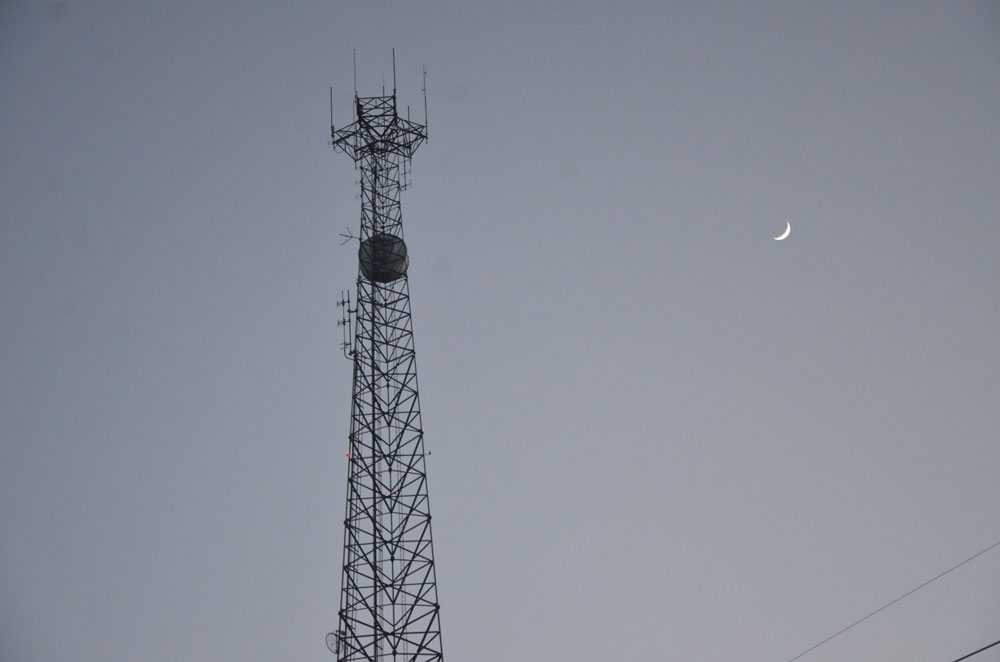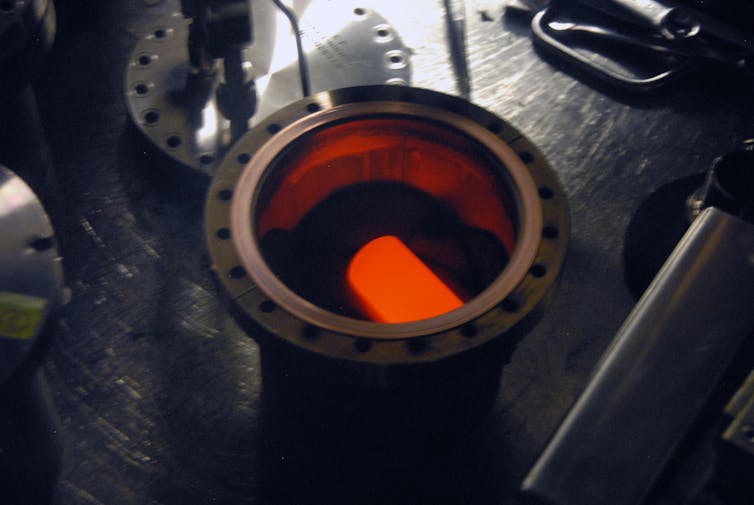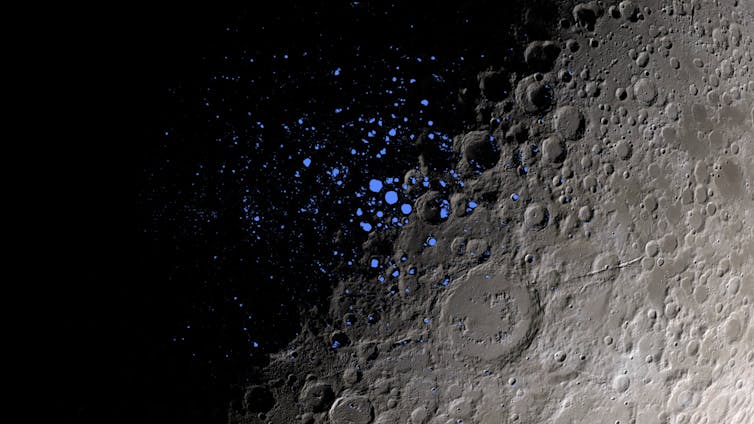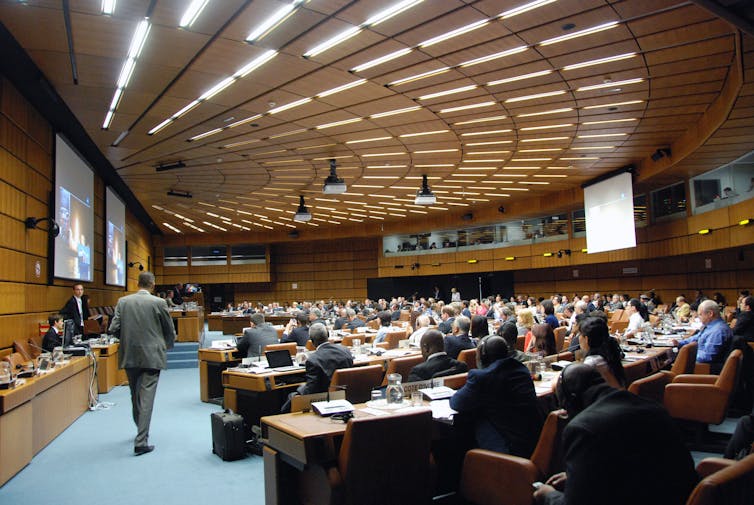
By Michelle L.D. Hanlon
The first space race was about flags and footprints. Now, decades later, landing on the Moon is old news. The new race is to build there, and doing so hinges on power.
In April 2025, China reportedly unveiled plans to build a nuclear power plant on the Moon by 2035. This plant would support its planned international lunar research station.
The United States countered in August, when acting NASA Administrator Sean Duffy reportedly suggested a U.S. reactor would be operational on the Moon by 2030.
While it might feel like a sudden sprint, this isn’t exactly breaking news. NASA and the Department of Energy have spent years quietly developing small nuclear power systems to power lunar bases, mining operations and long-term habitats.
As a space lawyer focused on long-term human advancement into space, I see this not as an arms race but as a strategic infrastructure race. And in this case, infrastructure is influence.
A lunar nuclear reactor may sound dramatic, but its neither illegal nor unprecedented. If deployed responsibly, it could allow countries to peacefully explore the Moon, fuel their economic growth and test out technologies for deeper space missions. But building a reactor also raises critical questions about access and power.
The legal framework already exists
Nuclear power in space isn’t a new idea. Since the 1960s, the U.S. and the Soviet Union have relied on radioisotope generators that use small amounts of radioactive elements – a type of nuclear fuel – to power satellites, Mars rovers and the Voyager probes.

Idaho National Laboratory, CC BY
The United Nations’ 1992 Principles Relevant to the Use of Nuclear Power Sources in Outer Space, a nonbinding resolution, recognizes that nuclear energy may be essential for missions where solar power is insufficient. This resolution sets guidelines for safety, transparency and international consultation.
Nothing in international law prohibits the peaceful use of nuclear power on the Moon. But what matters is how countries deploy it. And the first country to succeed could shape the norms for expectations, behaviors and legal interpretations related to lunar presence and influence.
Why being first matters
The 1967 Outer Space Treaty, ratified by all major spacefaring nations including the U.S., China and Russia, governs space activity. Its Article IX requires that states act with “due regard to the corresponding interests of all other States Parties.”
That statement means if one country places a nuclear reactor on the Moon, others must navigate around it, legally and physically. In effect, it draws a line on the lunar map. If the reactor anchors a larger, long-term facility, it could quietly shape what countries do and how their moves are interpreted legally, on the Moon and beyond.
Other articles in the Outer Space Treaty set similar boundaries on behavior, even as they encourage cooperation. They affirm that all countries have the right to freely explore and access the Moon and other celestial bodies, but they explicitly prohibit territorial claims or assertions of sovereignty.
At the same time, the treaty acknowledges that countries may establish installations such as bases — and with that, gain the power to limit access. While visits by other countries are encouraged as a transparency measure, they must be preceded by prior consultations. Effectively, this grants operators a degree of control over who can enter and when.
Building infrastructure is not staking a territorial claim. No one can own the Moon, but one country setting up a reactor could shape where and how others operate – functionally, if not legally.
Infrastructure is influence
Building a nuclear reactor establishes a country’s presence in a given area. This idea is especially important for resource-rich areas such as the lunar south pole, where ice found in perpetually shadowed craters could fuel rockets and sustain lunar bases.
These sought-after regions are scientifically vital and geopolitically sensitive, as multiple countries want to build bases or conduct research there. Building infrastructure in these areas would cement a country’s ability to access the resources there and potentially exclude others from doing the same.

NASA’s Goddard Space Flight Center
Critics may worry about radiation risks. Even if designed for peaceful use and contained properly, reactors introduce new environmental and operational hazards, particularly in a dangerous setting such as space. But the U.N. guidelines do outline rigorous safety protocols, and following them could potentially mitigate these concerns.
Why nuclear? Because solar has limits
The Moon has little atmosphere and experiences 14-day stretches of darkness. In some shadowed craters, where ice is likely to be found, sunlight never reaches the surface at all. These issues make solar energy unreliable, if not impossible, in some of the most critical regions.
A small lunar reactor could operate continuously for a decade or more, powering habitats, rovers, 3D printers and life-support systems. Nuclear power could be the linchpin for long-term human activity. And it’s not just about the Moon – developing this capability is essential for missions to Mars, where solar power is even more constrained.

United States Mission to International Organizations in Vienna, CC BY-NC-ND
A call for governance, not alarm
The United States has an opportunity to lead not just in technology but in governance. If it commits to sharing its plans publicly, following Article IX of the Outer Space Treaty and reaffirming a commitment to peaceful use and international participation, it will encourage other countries to do the same.
The future of the Moon won’t be determined by who plants the most flags. It will be determined by who builds what, and how. Nuclear power may be essential for that future. Building transparently and in line with international guidelines would allow countries to more safely realize that future.
A reactor on the Moon isn’t a territorial claim or a declaration of war. But it is infrastructure. And infrastructure will be how countries display power – of all kinds – in the next era of space exploration.
![]()
Michelle L.D. Hanlon is Professor of Air and Space Law at the University of Mississippi.





























MITCH says
WOW- wait a minute – isn’t the effects of the moon affecting tides and crops – a nuclear accident (explosion) on the moon & no more moon?
Pogo says
@Thanks for the warning Michelle
https://www.google.com/search?q=Michelle+L.D.+Hanlon+is+Professor
Look out below…
… I can already see the spam, filling my Junk folder: from class action law firms, arbitration specialists, etc., etc.
Skibum says
Lunar lunacy! The head of the FAA, is now supposedly a space “expert” too. Well, drumph’s space cadet is looking forward and upward… way, way up! He should keep his eyes focused much closer to where he stands, and concentrate on the safety of our skies right here in America!
There have been way too many close calls between commercial planes and other aircraft, including military aircraft sharing the same airspace. Our aircraft control system, both communications as well as radar, are woefully out of date and in need of serious repair and updates to ensure the safety of the traveling public… who are not interested in lunar exploration that will only take critical federal dollars and resources away from right here where they are needed most.
Whether this ridiculous proposal at the current time is an actual plan or just another made up distraction by this corrupt, felon led administration to divert our attention away from all that drumph and his team of terrible sycophants are doing to harm America, let’s not lose sight of what is really important. It certainly is NOT nuclear reactors on the moon!
Ed P says
Skibum,
Remember when a congressman was worried that Guam would capsize?
Of course says
Of course we will need nuclear power on the Moon, how else could it sustain life there after Trump and DeSantis send all of the homeless, political enemies and undesirables there that they don’t want to see in America. Imagine how many concentration camps they can build there, maybe even some future Trump TV coverage for the New Moon Hunger Games where the different camps will fight for their food and lives while his adoring public can place online wagers on the outcomes. Maybe they can partner with their favorite developers so they can make a fortune off of Moon property as well.
Laurel says
Yeah, let’s see how many other planets we can f’k up for a buck. Tides are annoying anyway.
Humans.